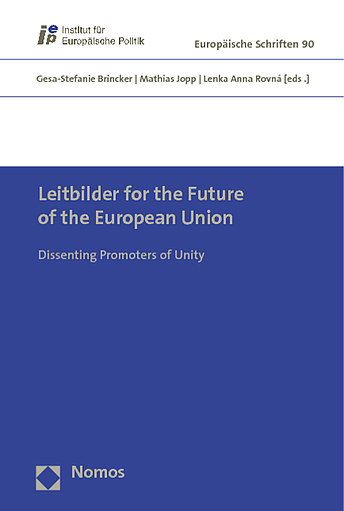englischAn ever growing European Union (EU)? Treaty reforms, EU-budget negotiations and Euro-zone enlargements: European integration was put to a great test at the beginning of the 21st century. How were these developments and especially the way to the Lisbon Treaty experienced in different EU member states? How did the variety of actors in seven exemplified countries react to these changes and a growing heterogeneity within the EU? How did they thus formulate their ideas for the future of the Union, their Leitbilder?
The approach of this research originates in the basic assumption that Leitbilder can be seen as a key factor in the development of the EU. Such Leitbilder contain conceptual statements dealing with the underlying institutional and constitutional construction of the EU and its potential finalité. They can also relate to elements of the integration process, for example specific policy areas. The analysis of Leitbilder in old and new EU member states answers the questions in which way the spectrum of the Euro-political Leitbilder changed with enlargement and if, as a consequence of potentially increasing heterogeneity within the EU, there are foreseeable tendencies of greater fragmentation, continuity or reinvention.
Vertragsreformen, EU-Haushaltsdebatten, Vergrößerung der Euro-Zone: Die Europäische Integration stand zu Beginn des 21. Jahrhunderts vor großen Herausforderungen. Der vorliegende Band analysiert, wie diese Entwicklungen, besonders der Weg zum Vertrag von Lissabon, in den verschiedenen EU-Mitgliedstaaten erlebt wurden. Er vergleicht zudem, wie die verschiedenen Akteure in sieben ausgewählten Ländern auf diese Veränderungen und die wachsende Heterogenität innerhalb der EU reagiert haben, und wie diese Entwicklungen ihre Leitbilder für die Zukunft der EU geformt haben.
Die Vorgehensweise dieser Untersuchung basiert auf der Annahme, dass Leitbilder als Schlüsselfaktor in der EU-Entwicklung gesehen werden können. Solche Leitbilder enthalten konzeptionelle Aussagen, die sich mit der institutionellen und rechtsstaatlichen Konstruktion der EU und Ihrer potentiellen Finalität auseinandersetzten. Sie können sich auch auf Elemente des Integrationsprozesses beziehen, beispielsweise hinsichtlich spezifischer Politikbereiche. Die Analyse von Leitbildern alter und neuer Mitgliedstaaten beantwortet die Frage, in welcher Weise sich das Spektrum der europapolitischen Leitbilder durch die Erweiterung verändert hat. Ebenso wird untersucht, ob es, als Konsequenz aus der potentiell steigenden Heterogenität innerhalb der EU, vorhersehbare Tendenzen hin zu einer größeren Fragmentierung, Kontinuität oder Neuerfindung gibt.


